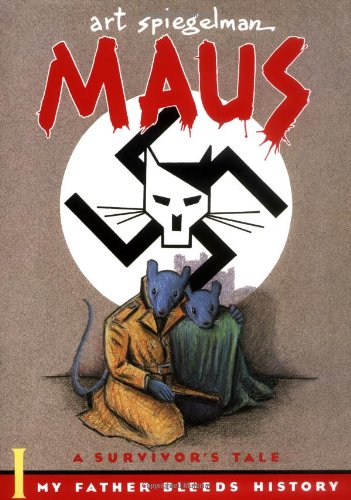All Nonfiction
- Bullying
- Books
- Academic
- Author Interviews
- Celebrity interviews
- College Articles
- College Essays
- Educator of the Year
- Heroes
- Interviews
- Memoir
- Personal Experience
- Sports
- Travel & Culture
All Opinions
- Bullying
- Current Events / Politics
- Discrimination
- Drugs / Alcohol / Smoking
- Entertainment / Celebrities
- Environment
- Love / Relationships
- Movies / Music / TV
- Pop Culture / Trends
- School / College
- Social Issues / Civics
- Spirituality / Religion
- Sports / Hobbies
All Hot Topics
- Bullying
- Community Service
- Environment
- Health
- Letters to the Editor
- Pride & Prejudice
- What Matters
- Back
Summer Guide
- Program Links
- Program Reviews
- Back
College Guide
- College Links
- College Reviews
- College Essays
- College Articles
- Back
Maus: A Survivor's Tale by Art Spieglman
“To write poetry after Auschwitz is barbaric” . . . [It means to] “squeeze aesthetic pleasure out of artistic representation of the naked bodily pain of those who have been knocked down by rifle butts…Through aesthetic principles or stylization…the unimaginable ordeal still appears as if it had some ulterior purpose. It is transfigured and stripped of some of its horror, and with this, injustice is already done to the victims.” –Theodor Adorno
In my Representations of the Holocaust we discussed this quotation at some length. We decided that it did not just refer to poetry but to all forms of literature. The idea being that it is wrong to write about Auschwitz because nothing can do justice to the people that went through it, and also that nothing good could have and should have come from the Holocaust. So, to profit from the horror is to deal an injustice to the victims. The first time that we really began to discuss this was before watching Schindler’s List but the topic reemerged when we read Maus.
Maus follows the author, Art Spieglman, as he tries to gather the story of his father’s experience with the Holocaust. The story flits back and forth between modern day America and World War Two Europe. Maus is not just about the Holocaust though. It is about the relationship between Art and his father. It is about the relationship between Art and his mother. It is the relationship between Art and the Holocaust, being a child of a survivor.
Maus is the winner of 11 literary awards, including a Pultizer, and was nominated for two others. It was critically acclaimed and is now used in many academic settings. In many ways Maus is exactly what Adorno was referring to when he gave his comments. It is a comic book with cartoonish animals representing one of the greatest atrocities ever committed by humankind. Does it really lighten the subject of the Holocaust?
I don’t think so. Maus is a different take on the Holocaust than anyone has ever and probably will ever write. It does remain; however, that Maus is the most artistic representation that I have come across. Maus is by far the most complex and interesting graphic novel I have ever read, and I have read Persepolis. The uses of allegory and metaphor; his ability to tell two stories at once, one within the words and another within the image, is outstanding; and his ability to keep the reader emotionally invested make this book a must read in several subjects but the question remains as to whether or not the Holocaust is a subject that should be included within that.
The fact that the Jews were represented as mice does not desensitize them in my opinion. The choice to make species distinctions between the ethnicities of the characters within Maus added another commentary that would not have existed with drawings of people. The ability to put on a mask of a pig and pass as a Polish man or the indecision on which animal to use because a person belonged to multiple categories helps to break down the barriers in the race argument. It shows the difficulties of using an animal allegory to begin with.
Final Verdict:
Literarily Maus stands as a gem because of the many subtleties and intricacies that make it academically fascinating. Beyond the introspection, Maus is a phenomenal read. The two books total a little over three hundred pages and, because it is a graphic novel, they go by very quickly. It is a book worth taking time to read though because of everything that could be missed by speeding through it.
I would say that people who enjoy graphic novels would probably enjoy Maus, which is true, but I think this book transcends being only for comic book readers. Fans of biographies or if you enjoyed Persepolis this is probably a book that is worth adding to your list. That being said it shouldn’t push anyone away who is interested.
Favorite Quotation:
“To die, it’s easy. But you have to struggle for life.”
Similar Articles
JOIN THE DISCUSSION
This article has 0 comments.

